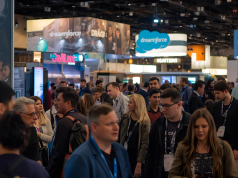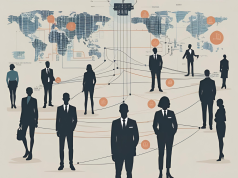As the unseen cogs of artificial intelligence (AI) grind away in the background of our everyday lives, there emerges a new epoch in which the boundaries between man and machine become blurred in the context of work. In this era, the synergy of human-machine collaboration is not merely an option but a cornerstone of productivity and ingenuity. The Work Times, with a vision mirroring the intellectual pursuits of The Washington Post, The New Yorker, and The New York Times, delves into the evolving saga of AI in the workforce.
In the tapestry of modern economics, AI is the shuttle weaving new patterns of employment and corporate strategy. No longer confined to the realm of science fiction, AI applications are revolutionizing job roles and the requisite skills for the workforce of tomorrow. The blueprint for success is being redrawn; occupations are morphing under the influence of automation and algorithmic decision-making, with data scientists, AI trainers, and user experience managers becoming the new vanguards of the labor market.
But this metamorphosis brings with it an array of ethical quandaries. When algorithms dictate the trajectory of one’s career, questions of fairness and accountability bubble to the surface. The imperatives of unbiased AI and the sanctity of privacy come to the fore, challenging businesses to navigate the narrow strait between innovation and the preservation of individual rights.
Beneath these surface ripples lie deeper socioeconomic implications. As the workforce adjusts to the AI revolution, a chasm threatens to divide those equipped for the digital age from those anchored in obsolescence. This digital divide, if left unchecked, could exacerbate existing inequalities and undermine the very fabric of inclusive growth.
Yet, amid these challenges, there are promising horizons. Employees, when armed with a new arsenal of AI-powered tools, can achieve unprecedented levels of efficiency and creativity. Managers equipped with predictive analytics can harness the collective brainpower of their teams, fostering a forward-thinking corporate culture that champions both human intuition and machine intelligence.
To chart this unexplored territory, The Work Times presents rigorous case studies demonstrating the successful integration of AI in various industries. From healthcare to finance, we see glimpses of a future where AI not only augments human capabilities but also unlocks new frontiers of possibility.
The narrative is clear: the AI revolution is not a harbinger of obsolescence for the human workforce but a beacon of a more collaborative and innovative future. To thrive in this landscape, we must embrace lifelong learning, adaptability, and a proactive stance on shaping AI policy.
The journey towards harmonizing the potential of AI with the integrity of human labor is fraught with complexity. However, with astute leadership and a commitment to ethical principles, we can steer this evolution towards a horizon gleaming with opportunity for all. Let us, through collaboration and dialogue, unlock the golden era of human-machine collaboration—an era that belongs to every worker, every workplace, and every dreamer in the relentless pursuit of progress.



























